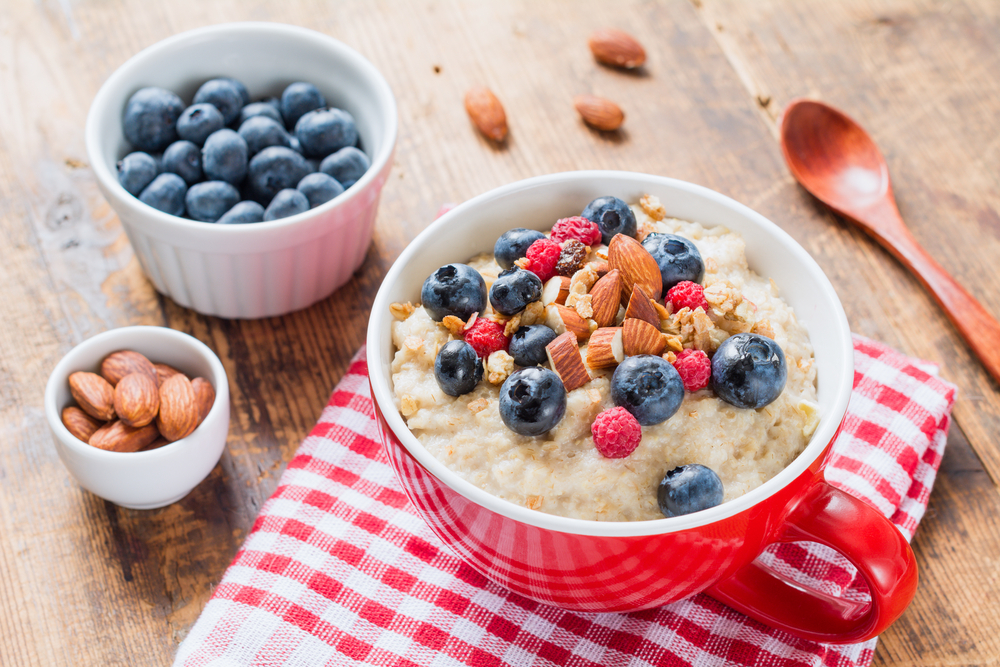A healthy breakfast is the most important meal of the day and should not be missed. It is therefore worth taking care to eat breakfast, even when we do not have time in the morning. In just a few minutes you can prepare a healthy and nutritious breakfast that will provide energy for the first half of the day. We suggest what should be included in a healthy breakfast.
Breakfast – how much calories
Breakfast should provide up to 30% of the total caloric value of the diet, i.e. from 450 kcal to 660 kcal, depending on the caloric demand. The amount of energy and nutrients that you will provide with breakfast will help you in the first half of the day when your organism efficiency is at its highest, your creativity will increase, your ability to solve problems, and concentration will improve. People who eat breakfast are less likely to develop diabetes, coronary heart disease and have lower body weight.
Healthy breakfast - what products should you choose?
Breakfast is the first meal after the night break, which provides replenishment of reserves exhausted during the night and energy for the first half of the day, therefore it should not be omitted and should be properly balanced. The caloric value of breakfast depends on the number of meals that we eat during the day
With three meals breakfast should provide even 30% of the daily caloric value of the diet, with four and five meals, 25% of the caloric value of the diet should be included in breakfast. Breakfast should contain products that will provide both easily digestible carbohydrates and quickly satisfy hunger, as well as longer digestible carbohydrates, thanks to which we will be able to use the energy provided from breakfast for a long time. You should also remember to include protein and fat products at breakfast.
It is worth noting that the breakfasts should be varied and include products from all levels of the food pyramid, cereal products, products providing animal and vegetable proteins, good-quality fats and vegetables or fruit.
Cereal products
For a healthy breakfast, choose wholemeal or graham bread, barley and oatmeal cereals or muesli. You can also prepare muesli yourself using oatmeal, dried fruit and nuts. Try to limit chocolate flakes, corn flakes and wheat bread, filled rolls, which provide simple sugars. Cereal products are a source of complex carbohydrates, fibre and vitamins, mainly B group and minerals.
Milk and dairy products
Choose milk and dairy products with a fat content of up to 2%. Yoghurts are perfect for breakfast (try to choose natural ones without added sugar, you can use them to prepare home-made fruit yoghurts by adding your favourite fruit to them), kefirs, buttermilk, cottage cheese and cheese, which are a source of animal protein and calcium. Limit ready-made milk desserts.
Vegetables and fruits
Include vegetables or fruits in each breakfast. You can serve vegetables in various forms, as an addition to sandwiches, spreads, pancakes, pancakes. Choose fresh seasonal fruits, and in winter, frozen as an addition to dairy products, you can prepare fruit cottage cheese, fruit yoghurt or fruit mousses.
Cold cuts, eggs, fish, choose lean meats, e.g. sirloin, poultry ham and fish such as tuna or salmon, which will work perfectly in the form of pastes and provide animal protein. As a substitute, you can also prepare spreads from legume seeds, which are a source of vegetable protein. Eggs are an excellent choice for breakfast, based on which you can prepare many both easy and more demanding breakfast dishes.
Use butter for fats, but try to limit its amount. If you choose soft margarine, pay attention to their quality, choose only good quality ones with low amount of trans fatty acids.
For drinks, various types of teas, coffee, fruit and vegetable juices, as well as milk and milk drinks will be suitable. Try not to sweeten them or to sweeten them in a limited amount.
Nuts and seeds eaten in moderation, due to their high calorific value, are an excellent addition to pastes and muesli. They provide value for health polyunsaturated and monounsaturated fatty acids as well as minerals and fat-soluble vitamins.

In the morning you don’t feel like eating? Ways to eat breakfast
Every morning is associated with a lot of activities that we have to do. Due to the rush and crowds of activities, we do not always manage to find time to eat breakfast. However, it is worth realizing the benefits of eating breakfast. It is, therefore, a good idea to plan in advance what to eat for breakfast, do some shopping or prepare breakfast components in the evening, e.g. egg spreads, fish spreads or legumes. You can also compose your own muesli or granola so that you have them for breakfast - just add yoghurt and it’s ready! You can also get up 15-20 minutes earlier, ask your relatives for support, go to bed earlier in the evening or reduce the number of activities in the morning, e.g. by preparing clothes in the evening.
The benefits of eating breakfast
Eating breakfast determines proper eating habits, people eating breakfast choose healthy whole grain products, cereals, fruit and vegetables and dairy products, they are also more physically active. Eating breakfast increases cognitive functions, improves memory, reduces the possibility of error, improves creativity, gives energy for the first half of the day, reducing the effect of fatigue. In addition, it also has a long-term effect, reducing the risk of diabetes and cardiovascular diseases. Additionally, eating breakfast helps to maintain healthy body weight. People eating breakfast eat fewer snacks and eat less caloric dinners.






